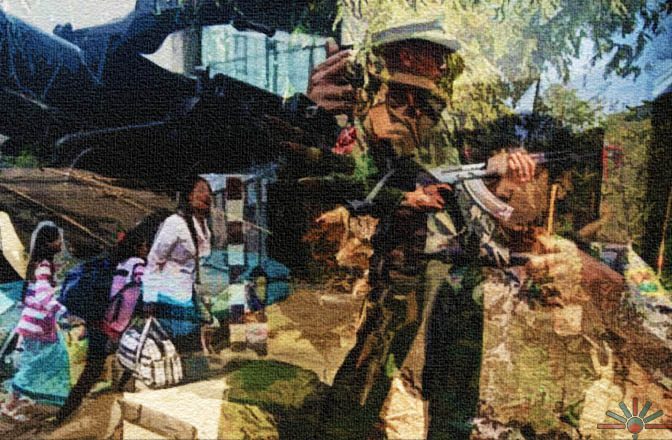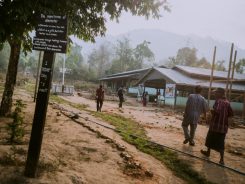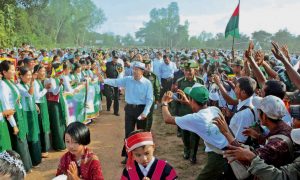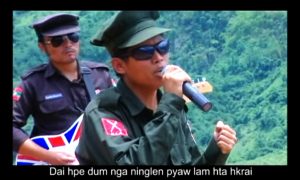On 15 August, three groups in the Northern Alliance, a coalition in Myanmar composed of four ethnic armed organisations, attacked a military training compound and security check-points in Pyin Oo Lwin township (Mandalay) and Goke Twin Bridge in Naung Cho township (Shan state). The groups involved were the Ta’ang National Liberation Army, Arakan Army and Myanmar National Democratic Alliance Army. The attack took place during the second extension of the Tatmadaw’s unilateral ceasefire, which expired on 31 August 2019.
Why did the attacks occur? The Tatmadaw first announced a unilateral ceasefire applied to five military commands on 21 December 2018. Prior to the August attacks, the ceasefire had been extended twice in order to facilitate the peace-making process. But the Tatmadaw purposely left the western military command in Rakhine state out of the agreement because of a series of armed clashes with the Arakan Army.
Since December 2018, the government and Tatmadaw representatives have met with the Northern Alliance three times to discuss a bilateral ceasefire, but no truce has been achieved. Participating parties have failed to even agree upon a suitable venue to resolve their problems.
Both sides have levelled the accusation that participation in the ceasefire agreement is nothing but a sweet-sounding cover for military and economic exploitation. Both parties benefit from military engagement through territorial enlargement, armaments, recruitments, extortion money and so on. These activities have resulted in misunderstandings and triggered minor armed conflicts, especially with the Northern Alliance in Shan state.
Moreover, the Northern Alliance has expressed a belief that the NLD government is missing an important opportunity to play a mediating role by aligning itself so closely with the Tatmadaw. They want the government to work as an active leader for peace in creating and managing meaningful ceasefire talks.
The sudden attacks this year may have been part of a strategy to reduce the military’s pressure in western Myanmar. In addition, the three ethnic armed organisations in the Northern Alliance may feel that the government and the Tatmadaw do not politically and militarily recognise their entities. The attack may have been a deliberate attempt to seek legitimate recognition. According to official declarations, the attacks are closely related to the local drug economy, as it is the mandate of security stations in the area to target and destroy drug trade. Whatever the cause, the actions of both parties seriously threaten the ceasefire and damages the trust-building between parties so crucial in peace negotiations.
What are the ramifications of the August attacks for conflict between the military and ethnic armed organisations in north and northeast Myanmar? The Northern Alliance’s attack on the Tatmadaw’s military training compound has seriously damaged the military’s prestige, both politically and militarily. At a press conference on 23 August, the Tatmadaw’s True News Information Team declared that it welcomes peace talks with the armed groups if they want to participate, but that it is ready to fight if the groups want to fight. One team member insisted that the Tatmadaw’s stance on the Arakan Army will not be changed. We can extrapolate from the comments that the Tatmadaw will not allow the Arakan Army to establish a stronghold in Rakhine State, but may consider the group’s base in Laiza to be acceptable.
On the day the second extension was due to expire, the Tatmadaw renewed its ceasefire for another 21 days in the five military commands, without covering western Myanmar again. The statement cites the need for more time to generate ceasefire talks. Although both sides have approved 16-17 September as dates to meet, disagreement over a meeting venue appears to be a stumbling block contributing to the stagnation of ceasefire talks. The government prefers Kyaingtong in Shan state to China or Panghsang in the Wa region of Shan state, as is being proposed by the Northern Alliance.
Notes from the Salween Peace Park
Weary of Myanmar’s elite-driven peace process, some communities in Karen State are trying something different.
The following day, Sun Guoxiang, the Chinese Special Envoy for Asian Affairs, called the Federal Political Negotiation and Consultative Committee—in which the Northern Alliance is a member—and called upon it to stop the ongoing fighting against the Tatmadaw. The call indicates that China does not accept armed clashes that might indirectly affect Chinese economic and strategic interests in Myanmar. China seems to have an informal capacity to pressure and influence the Northern Alliance.
There is a small hope the two parties will reach a firm agreement during this third extension. But armed conflicts between the Tatmadaw and the Northern Alliance continue. Under these circumstances, both sides may face a blame game because they can take military advantage of the unilateral ceasefire announcement. Both have a chance to enlarge their territory, mobilise military personnel and expand their businesses during the ceasefire period. These actions can cause a decline in trust-building during talks.
If the fighting continues until the 2020 general elections, it will likely affect Myanmar’s fledgling democracy by eroding the trust voters have in the NLD to broker meaningful peace. Initiating face-to-face negotiations is a good move to restart political dialogue. Although China plays an important role as an informal international moderator, we should have our own domestic negotiator to drive a peace deal that is meaningful for all actors.
 Facebook
Facebook  Twitter
Twitter  Soundcloud
Soundcloud  Youtube
Youtube  Rss
Rss 



